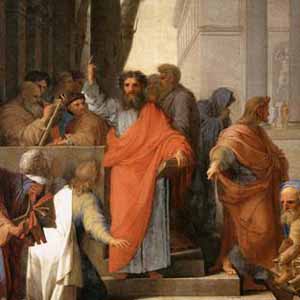
Review: Inventing the Individual: The Origins of Western Liberalism (Allen Lane) by Larry Siedentop
Those of us who think of ourselves as liberal-minded secular democrats will not have much time for royal weddings and christenings and investitures, let alone grand coronation ceremonies like the one last seen in Britain in 1953. The theatrical rituals of the Church of England are ridiculous enough, and those of the British state in one of its bouts of self-congratulation are even worse. But there is something uniquely preposterous about the hullabaloo that surrounds the installation of a new monarch. How can people look so glum in all that high-camp gear? How can the Archbishop of Canterbury keep a straight face when he anoints the monarch with consecrated oil, before handing over the orb, ring and sceptre, and placing a crown on the royal head? And how can anyone take it seriously, in a democratic age where there is no longer any meaningful connection between church and state?
Larry Siedentop is a liberal secularist too, and no devotee of either religion or monarchy. But after reading his lucid, genial and fascinating book I begin to glimpse something quite impressive, even inspiring, behind the theologico-political hokum. Siedentop believes that we secularists are “victims of our own historiography”, suffering from a strangulated and foreshortened sense of our past. We tend to think that the great anti-clerical writers of the 18th century – Gibbon, Hume and Paine – simply stumbled on some obvious truths about reason, freedom and equal human rights that had somehow not been noticed before. We then dismiss the whole world of thought preceding them as a Dark Age of immobile prejudices and irrational superstition: century after wasted century in which nothing much happened till the clouds began to part in the Renaissance and the Reformation, after which the Enlightenment happened and everything was illuminated.
Calmly but persuasively, Siedentop argues that we have got it all completely wrong. Grand historiographical concepts like Renaissance, Reformation and Enlightenment are “vastly inflated”, he says, and if we set them aside we will be able to see that modern secularism, far from marking a decisive break with Christian traditions, is actually a product of them, and testimony to their energy, originality and creativity.
When, at the beginning of the ninth century, the church started to muscle in on the crowning of kings and queens, it was not cosying up to the royals but holding their feet to the fire and forcing them to take a lesson in humility. The prelates were reminding the ruling elites of the debts they owed to the mass of their ordinary subjects. “Their sweat and their toil made you rich,” as one of them put it, “and in birth and death you are alike.” They cited St Augustine, who said that “he who tries to rule over others – who are by nature his equals – acts with intolerable pride”, and Gregory the Great, who said that “when a man disdains to be the equal of his fellows, he becomes like an apostate”. Or as one bishop told the King of the French: “Some so-called wise men say that the prince, being king, is not subject to the laws or judgement of anyone; but such language is full of blasphemy, and kings ought to be subject to those who anoint them in the name of the lord.” Christian militancy, it seems, was leading a long political revolution which, as Siedentop puts it, “provided grounds for an appeal against injustice that had not been available in the ancient world”.
Siedentop is not an ordinary academic writer, cowering in anticipation of the nagging criticism of specialist colleagues. He is an acknowledged expert on 19th-century political thought, but in Inventing the Individual he has undertaken a high-altitude survey of Christian theological activism in Europe over almost two thousand years, from before the formation of the Roman empire to the rise of absolute monarchy and the invention of the nation-state. He relies entirely on secondary sources, not all of them bang up to date, but if the details of his story may be subject to refinement or correction, its main lines are undoubtedly correct.
The prologue is set in ancient Greece, which secularists have always been tempted to treat as an earthly paradise, demonstrating how freedom, grace, rationality and happiness were able to flourish before the world was overrun by joyless hate-filled priests. But this image is absurd: if the city-states were not themselves oppressive dictatorships, that is because they were ruled by coalitions of petty tyrants – patriarchs running complex family enterprises in which they disposed of women and children and slaves exactly as they pleased, enforcing their authority with a terrifying range of religious cults centred on themselves, their ancestral hearth and their proprietary divinities. To be excluded from such a family was to be an exile, an outlaw or an idiot in the original sense of the word, and it could entail a fate far worse than death.
There was of course plenty of human life outside these patriarchal tyrannies: not only the celebrated sophists who turned social exclusion to their pecuniary advantage by becoming wandering teachers, but also poor farmers in the countryside, and weird barbarians further afield. When Rome began to eclipse classical Greece, however, carrying its own version of civilisation through Europe and round the Mediterranean, it found itself confronted by several powerful tribes who demanded recognition for their own notions of religion, politics and morality. None of these tribes posed a bigger challenge than the Jews, whose austere monotheism threatened to make the ever-expanding pantheon of domestic deities in Rome look untidy, artificial and absurd. The Jews were denounced by their imperial conquerors as atheists, on the grounds that they denied the existence of any number of gods; but according to Siedentop their image of divine power as “single, remote and inscrutable” had a peculiar appeal to the disempowered multitudes. Then there was Jesus of Nazareth, the turbulent Jewish teacher who, apart from being another notorious atheist, argued that his so-called deity took a special interest in the wretched and the poor, and in women, children, invalids, criminals, sinners and slaves.
St Paul was one of many Roman subjects who overcame an initial revulsion at the teachings of Jesus to become a passionate advocate. His writings were never free of ancient prejudices, but they served to shift moral attention away from the patriarchal family to its individual members, each of them an equal beneficiary of God’s merciful grace. The idea that every believer should have private access to a priest allowed women and children to look outside the family for guidance and support, and Christianity became in some ways the world’s first equal-opportunity religion. Ancient epics about aristocratic warrior-heroes started to be displaced by tales of martyrs, which, as Siedentop puts it, “provided a model of heroism open to all”.
When the emperor Constantine converted at the beginning of the fourth century, he held himself responsible not to himself and his family and a handful of powerful patriarchs but to a mass of individual souls overseen by divine providence. The imperial project was reinvigorated in Rome five hundred years later, when the Pope placed a crown on the head of Charlemagne, signifying that the empire could not be governed without the sworn consent of all its Christian subjects. The newly instituted monasteries of Western Europe then started to endow humble labour with a dignity it had never had before, while providing an unprecedented model of collective self-government. The monasteries were eventually joined by an international network of innovative educational institutions – the universities, which fostered ruthless logical disputation in their arts faculties, while their schools of law established the autonomy of secular power and worked out a new form of justice based on the principle of giving a fair and reasonable hearing to all contending parties. Human existence was thoroughly remodelled, both practically and intellectually, and a new form of self-conscious subjectivity was born. Reason ceased to be a monolithic external authority, and transformed itself into an individual talent that each of us should exercise to the best of our ability. At the same time, the old idea of natural moral laws inscribed in the objective structure of the universe gave way to a notion of natural rights inhering in each of us, subject only to the authority of our private conscience.
Siedentop presents his argument as a belated rebuke to those liberal-minded secularists who insist on ignoring the deep historical roots of their ideas. In some ways, however, Friedrich Nietzsche could be said to have got there before him. Nietzsche started his brief but incendiary career by contesting the rosy old image of the ancient world, and went on to trace the whole panoply of modern progressive values – democracy, socialism, feminism, equality and human rights – to the rise of Christianity. The difference is that Nietzsche took the side of ancient heroes, patriarchal tyrants and unaccountable aristocrats. He regarded Christians as servile plebeians who peddled a vindictive slave-morality, born of bitterness, resentment and envy, which eventually destroyed the glory that was Greece and the grandeur that was Rome. With his defiant swagger and a glint of fanaticism in his eye, he has become a role model to many who regard themselves as courageously broad-minded. But anyone who reads Siedentop will realise that we might be better advised to dump Nietzsche, and take the side of the plebeians and the slaves.

